Figures Don’t Lie, But Liars Figure
The Left is highly selective about when the data matters, but when it decides it does, it expects everyone to draw all our conclusions based on the data alone.
It’s an adage attributed to Mark Twain (what isn’t?) meaning that numbers are what they are, but people can use numbers to convey falsehoods. It came to mind while following the recent discourse about crime.
According to official statistics, crime in the first quarter of 2024 has dropped significantly:
Those are some big drops. They should be eyed skeptically, not because they might be false, but because a fundamental tenet of statistical analysis is that any large departure from a trend is unusual, if not impossible.
Many observers noted that a large number of agencies didn’t report their numbers to the FBI, possibly explaining these massive drop-offs. There’s debate over how much this lack of reporting impacted the statistics, but I think this is all a distraction, in the end. Crime rates don’t get at what the real problem is, but we’ll talk about that later. For now, let’s discuss why reporting crime statistics in no way settles the discussion on whether crime is getting better or worse in the United States.
First, we’re not exactly dealing with honest interlocutors here. I’ve explained before that we’re constantly being told by those in the opinion-shaping business when the data matters and when it doesn’t. Crime is the one topic where this phenomenon is most acute. It shouldn’t come as a surprise, given how loaded a topic crime is, but it’s also unfortunate, since we’re talking about people’s lives here.
Consider columnist Matthew Yglesias, whose product is pro-Regime propaganda laced with intellectualism. Here he is, attributing the rise in crime since 2020 to President Donald Trump, even though, by his own admission, it’s part of a much longer-term rise in violent crime since 2014:
Never mind the crime spike which began in 2020 had its origins in the biggest riots the country had seen in over a half century. Given that it was the Left who encouraged these riots to take place, I’m not sure what responsibility President Trump bears for it, unless Yglesias’ point is that Trump didn’t do enough to crack down and restore law and order, which I highly doubt to be his argument. And while Yglesias believes Trump to be the cause of the the rise in crime the last several years, he also believes the better-performing economy during his presidency pre-2020 was entirely inherited. Regardless of where you stand on these issues, does Yglesias sound like someone whose judgment can be trusted?
Second, the data is important to the discussion, but it isn’t the entirety of it. The Left is highly selective about when the data matters, but when it decides it does, it expects everyone to draw all our conclusions based on the data alone. Suddenly, your feelings and “lived experiences” don’t matter. Nobody analyzes the world entirely through statistical realities, however. If you become a victim of crime or live in a dangerous area, it doesn’t matter that murder or whatever is down X-percent from the previous year.
Third, if you look at the history of violent crime in the U.S., two things stand out. First, crime maybe lower than it’s ever been, but it’s also more or less leveled off:
You may also notice that crime rates still remain quite high overall. It’d be intellectually dishonest to say crime is out of control, but it’s equally intellectually dishonest to say we’re living in a time where the risk of becoming victimized by crime in America is negligible.
If you focus exclusively on homicides, you’ll see that while fewer people are being killed today than they were almost 30 years ago, more people are being killed today than 10 years ago, by a wide margin:
The implication here is that while crime isn’t getting any worse, it not only remains quite high relative to the developed world, it’s probably not going to get any better than it already is, given present trends, demographics, and the deteriorating internal situation. That’s a different discussion altogether, but my point is that the history of crime in America for the last 50 years has been one of “violent” versus “more violent.”
If anyone wants to say that crime is getting worse, one must do so with the understanding that crime has been bad in the country for a long time and was at rates much higher than today within the last 15 to 20 years. Likewise, if someone like Matt Yglesias says crime is going down, they must do so with the understanding that not only is crime still high, based on the historical record, it’s not likely to get much better. What was the victory achieved, here?
I don’t like to zero in on homicide rates, since they occur less frequently than other crimes. Unless embroiled in civil war like Mexico or an exceptionally crime-ridden country like South Africa, murders are more sensitive to statistical variance, since most people aren’t killers and, in countries that still have halfway-decent law enforcement, the bad guys eventually do get taken off the street or killed. But America’s historical homicide rates do throw cold water on the the fact that crime has dropped so significantly year over year. The percentages don’t translate to any meaningful change to the “strategic” environment.
Let’s speculate for a moment on why crime did drop so drastically. Assuming the numbers are trustworthy and the absence of reporting by many agencies doesn’t distort the picture, the drop can be attributed to the same reasons why crime rose so dramatically. As many criminals as the U.S. has, they’re still a minority of the population. After about a year or two of having fun at everyone else’s expense, the bill is now coming due.
Criminals are now either being jailed or killed as their offenses mount or they finally end up in police crosshairs. It isn’t due to better law enforcement; if anything, the trend has been in the opposite direction. It absolutely isn’t because Joe Biden has handled this issue well at all; the current president has had next to nothing to say about crime. To the extent that he has, it’s been to give cover to criminals and validate the false narrative that the real problem in America is discrimination and disparities in the justice system. If this is the reason why crime is declining in the U.S., then do we really have a handle on the problem at all? Or are we just placating the barbarians?
Crime Went Down. What Now?
Whatever the case may be, let’s think about this as preppers: if crime is going down, what are we supposed to do with that information? If crime were going up, the answer would be more straightforward. What are we to do with the knowledge that crime is going down? What sorts of lifestyle changes should we make?
Can we now trust strangers to watch our belongings in public while we go use the restroom? Shall we leave the doors to our residences unlocked? Shall we let down our guard? What exactly are we supposed to do now that the violent crime rate is down so dramatically? And what’s to say the numbers won’t go back up again? Do the numbers translate to any real change in the personal safety landscape for Americans? These are all very important questions, but those who selectively trust the data, like Matt Yglesias, have no answer for them, nor do I get the sense that they’re even interested in addressing them.
A big component of my thesis is that there exists a concerted effort on the part of state and the perception-shaping elements of the Regime to influence Americans to let down their guard to normalize much higher levels of violence and disorder to come. One way to do that is to make people think things are getting better when they’re not. I’m not denying that crime rates are down - I have nothing to counter the narrative - but unless the drops in crime dramatically change the social environment in America, the numbers are quite useless from a practical standpoint, actually. Really, how many people out there are willing to risk letting their guards down, living like we’re in a high-trust society like Iceland or Japan, because the numbers show that the crime situation has improved?
The size of the U.S. also makes national crime statistics misleading, if not entirely irrelevant. You could make the argument America is many countries in one, but my point is that a country of this size will see tremendous variance across its expanse. It simply doesn’t matter that crime rates across the country are down if you live in St. Louis, a city with crime rates higher than the world’s most violent countries, isn’t seeing those decreases.
Let’s look at the country’s largest city, New York. Here’s the crime picture the week of June 17 to June 23:
New York is seeing some year-over-year declines, most notably in murders and burglaries. But it’s still seeing increases in other serious crimes, and you can see the overall situation hasn’t improved remarkably. New York is pretty much the same place today it was a year ago.
More significantly, notice that not only has crime increased 5.6% in two years, it’s increased 35.2% in 14 years. This means the “historic lows” narrative should no longer apply (the same goes for national rates). It doesn’t mean a whole lot to say the country is much safer than it was 30 years ago, since that was so long ago and crime is up over a more recent time frame, in spite of the drop this year from last.
It may not be fair to pin all this on Biden, but in no way can the decrease in crime be in any way credited to Biden. Crime is, again, ultimately a local matter. Short of deploying the military to restore order, presidents cannot fix the crime problem. They can, however, make it worse through their rhetoric and providing political cover to sow disorder across the country. Obviously, you need policymakers and bureaucrats at lower levels to implement such a regime, but they’re ultimately part of a larger political ecosystem that ends at the White House. Really, why would the components of this ecosystem do anything about crime if the guy at the top doesn’t see it as a problem?
Back to the data; 2024 being an election year, there’s going to be a lot of perception-shaping, a lot of the Regime telling us what data matters and when it matters. The effort is in full-swing, particularly within the camp trying to get President Biden re-elected:
The facts do seem to be on the Regime’s side at the moment. At some point, it’s worth asking:
If the economy is pointed up, why are so many people feeling the squeeze?
If crime is pointed down, why do so many people believe law and order is breaking down?
Those of us who study social issues in depth often lament the fact that public perception is divorced from reality. At the same time, it’s worth remembering: people can often be unreasonable, but they’re typically rational. There are few perceptions more divorced from reality than the matter of Blacks being shot by police, but we’re told we need to give the Black lived experience its due regard. Why not the same for the economy and crime?
Though even the Left today recalls the pre-2020 Trump years as a boom time for the economy, I can attest, as many reader might, that the media wasn’t trying to paint a rosy picture of the situation back then. Stories of inequality were common at the time; where did all those stories go? Did Biden manage to fix inequality in four years?
We should look upon public sentiment with skepticism. But we should also view official narratives with even more of it. There’s always an agenda behind official pronouncements. They may be fact-based, but at the end of the day, it’s all about shaping perceptions. It’s part of the game regimes have to play in order to stay in power. That doesn’t mean we have to accept it mindlessly, however.
Take it from Fabian Ommar, someone whose entire life involved living under untrustworthy governance:
I think the quality of governance should never alter one’s level of skepticism in the government. It’s nice to be able to trust the people in power and on some level, we need to be able to. But what the government says should never come before your personal judgment of the situation. The government is in no position to tell you what’s going on in your world.
No matter how well the economy performs, it doesn’t matter unless you’re reaping the benefits of it. No amount of propagandizing by the Matthew Ygelsiases of the world will change that. No matter how much crime went down nationwide, it doesn’t matter unless your area is seeing those decreases or the decreases permit drastic changes in lifestyle. Anyone who’s going to start leaving everything unlocked or be less vigilant in light of the crime data is a fool who’s going to learn the hard way why you never take the numbers at face value.
When it’s all said and done, we’re all responsible for our own well-being. It’s not something to be outsourced to the government or the experts. Prepping is about being more responsible for ourselves, so use data to help assess your situation, but not make the decisions for you. Remember always that your heart and mind is a battlefield. Be mindful of the fact perception doesn’t equal reality and be willing to challenge your own assessments as much as that of those in positions of authority. But never, ever, allow your integrity and intuition to be compromised just because the president or someone with impressive credentials told you otherwise.
When it doubt, trust your gut. Always.
So What Is The Big Deal?
At the end of the day, this isn’t really an issue about crime rates, even as America remains quite a violent country. It’s about how crime gets dealt with when it occurs. I reject the characterization of the U.S. as a crime-ridden hell-hole, but it’s absolutely the case that the country doesn’t take seriously the upholding of rule of law or maintaining order. Obviously, this would be less of a problem is crime rates were low, but crime rates are high in large part because of the state’s inability to perform its most fundamental of functions.
Consider:
I don’t have access to the data Rob Henderson cites, though he’s broadly considered to be a trustworthy academic. What he says does comport with what I’ve seen elsewhere. Even if what he says isn’t accurate, I’m not sure it matters, because even when the worst of criminals are arrested, they never get dealt with the first time.
Consider the case of Bionca Ellis, who fatally stabbed three-year-old Julian Wood to death in Ohio earlier this month:
NEW: Bionca Ellis, the monster who kiIIed [sic] a 3-year-old boy and laughed about it in court was known to police and has a long criminal history.
She called police in February and said she m*rder*d someone in CA and wanted to kiII people and eat their flesh. At the time she had 3 warrants out for assault. She was not arrested.
She was finally arrested 4 days before the fatal stabbing. They recommended a mental health check but a judge released her without a hearing.
The system failed the Woods family. This psycho should have never been out on the streets.
There’s a racial component to this case - Ellis is Black, her victims White - which matters, but I won’t get into that. For now, focus on how many times the system failed. When something fails that often at so many levels, it’s either broken, or it was deliberate.
Then there’s the horrific murder of 12-year-old Jocelyn Nungaray, a crime so appalling I don’t want to get into its details (check my X account to see what I really think). Her murderers were illegal immigrants and were allowed to stay in the country:
But wait! There’s more:
On top of murders, the Tren de Aragua gang is bringing their rampant thievery to America from Venezuela. It’s something which needs to be talked about more, but not only is illegal immigration a huge problem, Venezuela specifically is becoming a national security crisis.
Then there’s the murder of 37-year-old Rachel Morin, mother of five, in Maryland, by in illegal immigrant from El Salvador, who was already suspected of murdering a woman in his home country. Her killing is another one so heinous, I’d rather not talk about it right now, but what you need to know is that her murderer is a truly dangerous person, there’s simply no excuse for him having been in the country. Our immigration policies, the anarcho-tyranny ruling this country, are what led to these outcomes. It’s not mere incompetence.
Julian Wood. Jocelyn Nungaray. Rachel Morin. Then there was Laken Riley plus many others from earlier just this year alone. Our women and children are being killed by the special classes. And the Regime are indifferent at best, at worst they see them as necessary sacrifices so a single migrant might live the American Dream.
To add insult to atrocity, the judge involved in the prosecution of Nungaray’s murderers is this woman:
The arrogance. The shamelessness. Hidalgo is yet another activist-official, a phenomenon which has become alarmingly prevalent in our government at all levels. Anyone who isn’t a malicious activist knows that immigration status absolutely matters when it comes to importing criminals into this country. Every crime committed by an illegal migrant is a crime that would’ve never happened had they not been in the country to start. But who are we kidding?
It gets worse:
Hidalgo has already generated tremendous controversy during her time in office, along with corruption charges. It really shakes your confidence that Nungaray’s murderers will get any kind of commupence, doesn’t it?
Hidalgo calls herself a “proud immigrant” on her X profile. She did not move to the U.S. until she was a teenager and became a citizen fairly recently. Clearly, she feels neither duty nor loyalty to Americans, whom she ostensibly represents. How does she and so many others like her rise to positions of prominence and tremendous responsibility?
That’s a talk for another time. But I don’t think it’s any hyperbole to say this feels like an occupied government. As an X mutual said in response to Hidalgo blaming Nungaray’s murder on former president Donald Trump:
Watching this one gets the sense that a critical system has experienced multiple redundant failures in order to bring it to a state in which this woman could be appointed as a judge. It's similar to the cascade that needs to occur for a nuclear meltdown but likely more widespread
This woman is very clearly of sub standard intelligence and yet holds a position of authority that in any properly functioning society (that was interested in its own long term survival) would be held only by individuals in the top 5%.
Here’s the thing: I’m not sure someone like her becoming a judge in America is a failure. The purpose of anarcho-tyranny is to achieve precisely such results. As long as this is what we live under, what difference do crime rates make?
The Right Side Of History
Let’s close with some wisdom. X account “wanye” explains what the purpose of punishment is in society:
The problem with thinking about it this way is that a jail sentence is really kind of an odd thing, if you think about it. What are we trying to do there? And who are we trying to do it to?
If a 19-year-old college student gets into an argument with his girlfriend and throws a chair through a window and gets arrested and feels embarrassed and regrets what he’s done and ultimately spends a few days in jail, then you’ve probably accomplished something.
Point made.
But if we’re talking about some homeless guy who has committed 72 similar crimes over the last decade, then what are we actually doing here? And why do we think we can discuss the appropriateness of any particular punishment for this one crime as if the issue isn’t really a decade-long pattern of behavior?
This is the thing everybody gets wrong about three strikes laws. “Did you hear about the guy who got 10 years for stealing a candy bar.” Don’t be ridiculous. The people in those stories got long sentences because society needs a way to say, “the specific details of this latest incident aren’t all that relevant, because the point is that we are tired of your bullshit and it ends here.”
America’s problem isn’t that there’s too much crime. There isn’t - yet. America’s real problem is that our self-appointed superiors have decided there’s nothing to be done about crime or that nothing should be done about it because inequality, poverty, racism, whatever. They’re willing to spill the blood of their own citizens just so they can say they were on the right side of history.
The thing is, the right side of history isn’t justice. It’s survival. Yet everything the Regime is doing is anti-survival. We aren’t headed towards civil war because we disagree on politics; we’re headed for civil war because they’re trying to lead us, the lambs, to the wolves for slaughter, and there aren’t any sheepdogs to be found.
But what do you think? What’s your reaction to the latest crime statistics? What are we supposed to do with the data? Shall we be less concerned with crime, or is there still reason for concern? Can we even trust the data? What do you think is the real problem this country is facing?
I look forward to a scintilating discussion in the comments.
Max Remington writes about armed conflict and prepping. Follow him on Twitter at @AgentMax90.
If you liked this post from We're Not At the End, But You Can See It From Here, why not share? If you’re a first-time visitor, please consider subscribing!

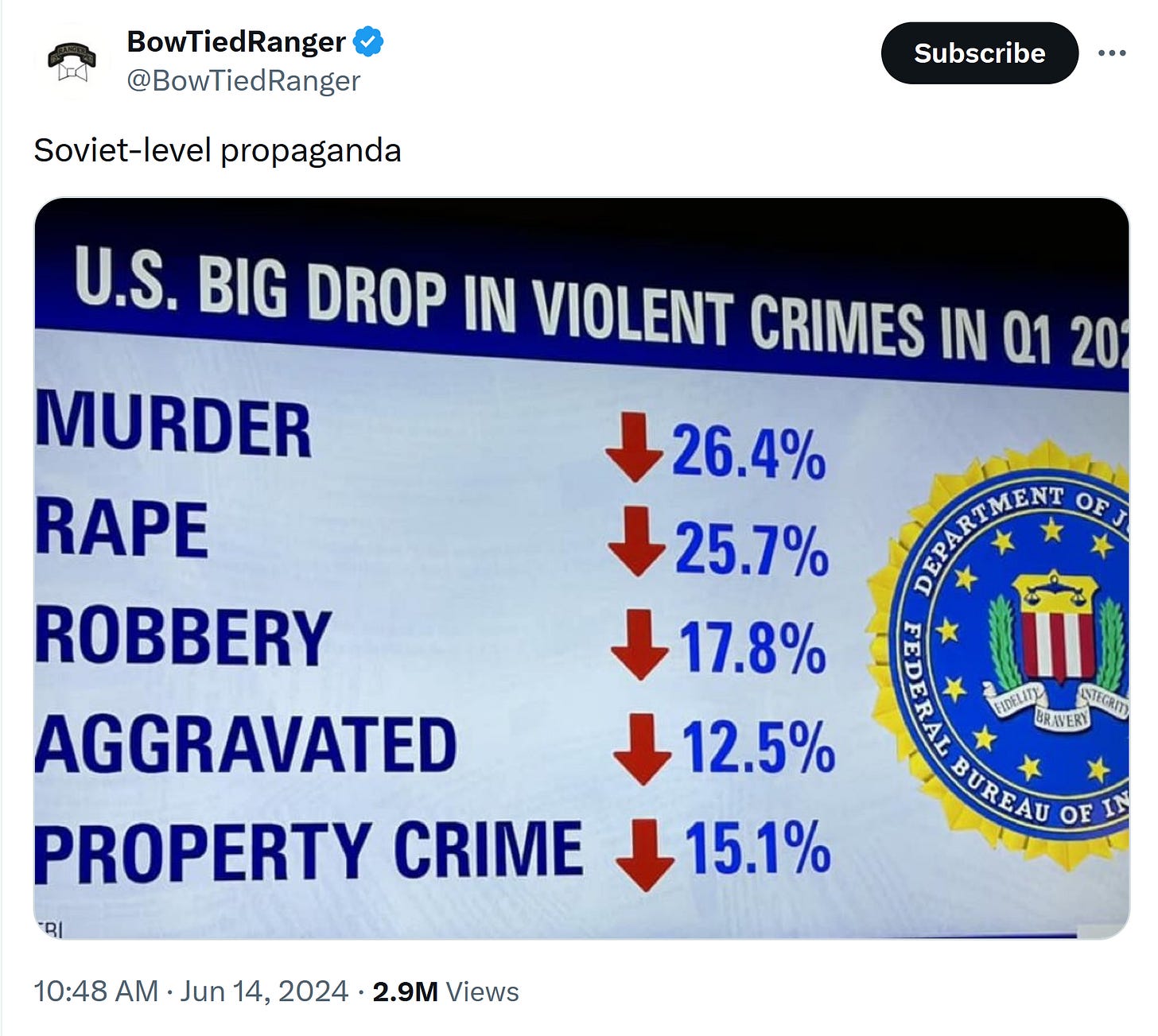



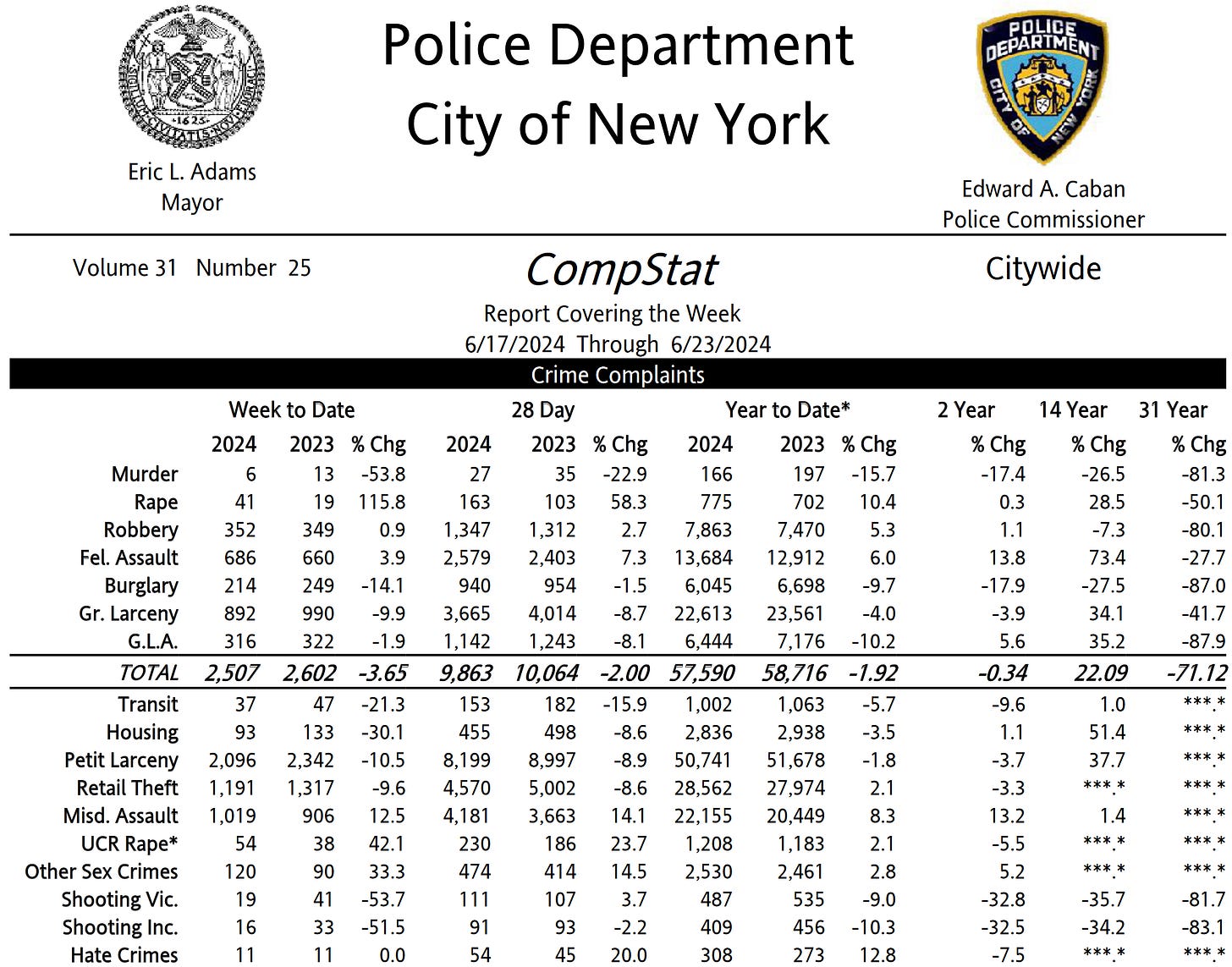

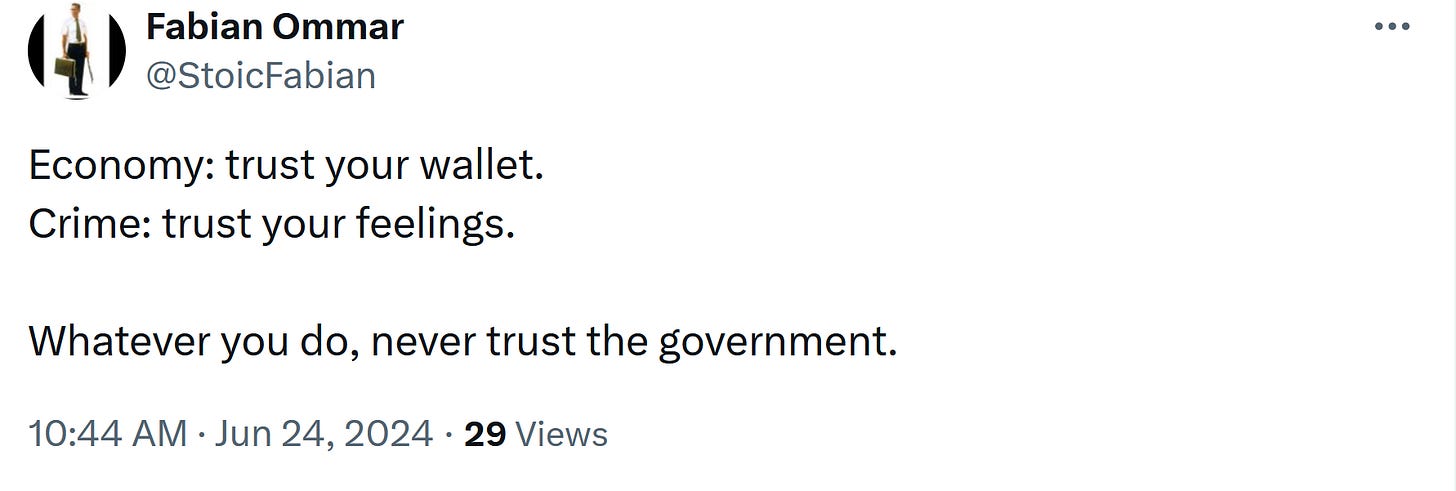



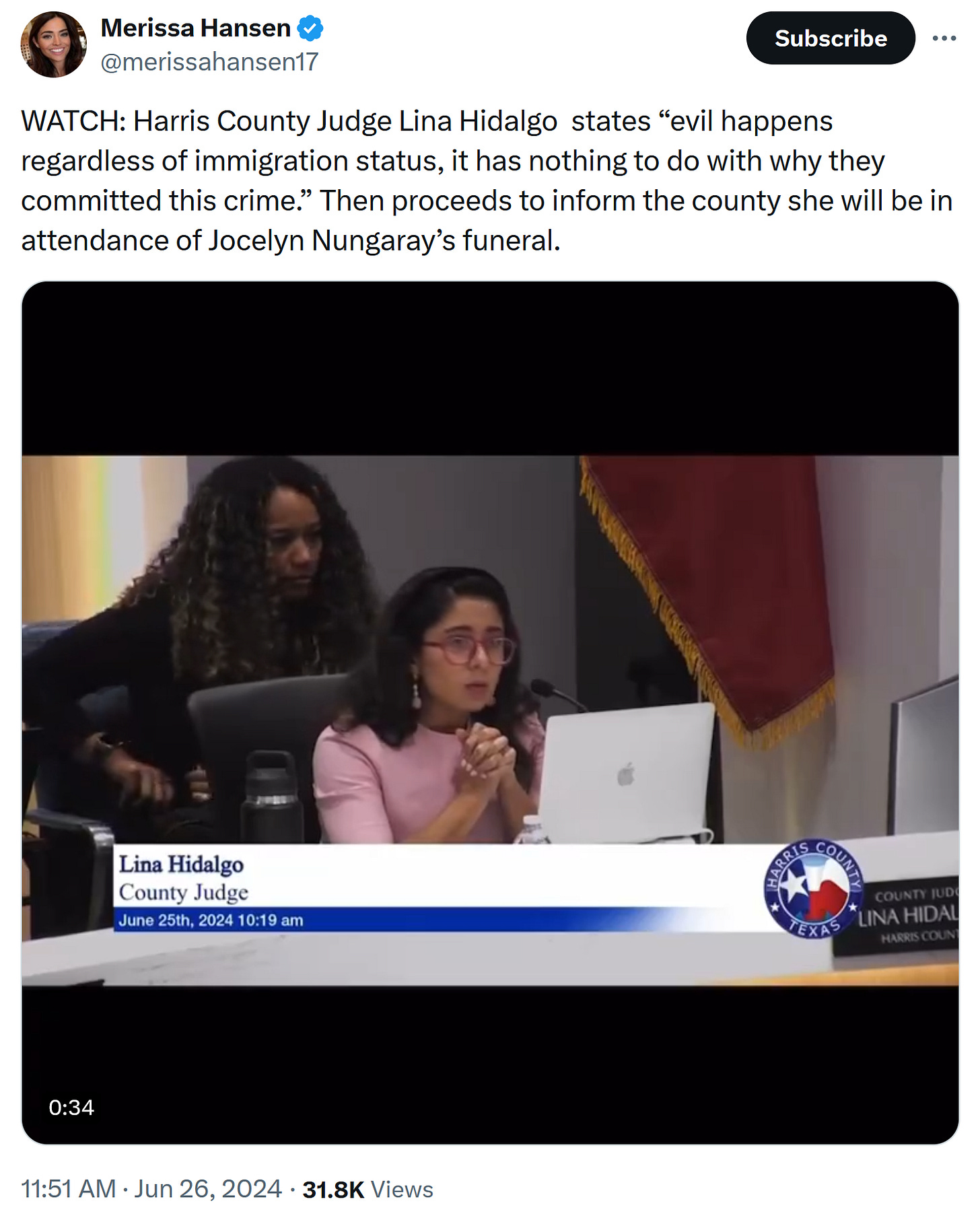
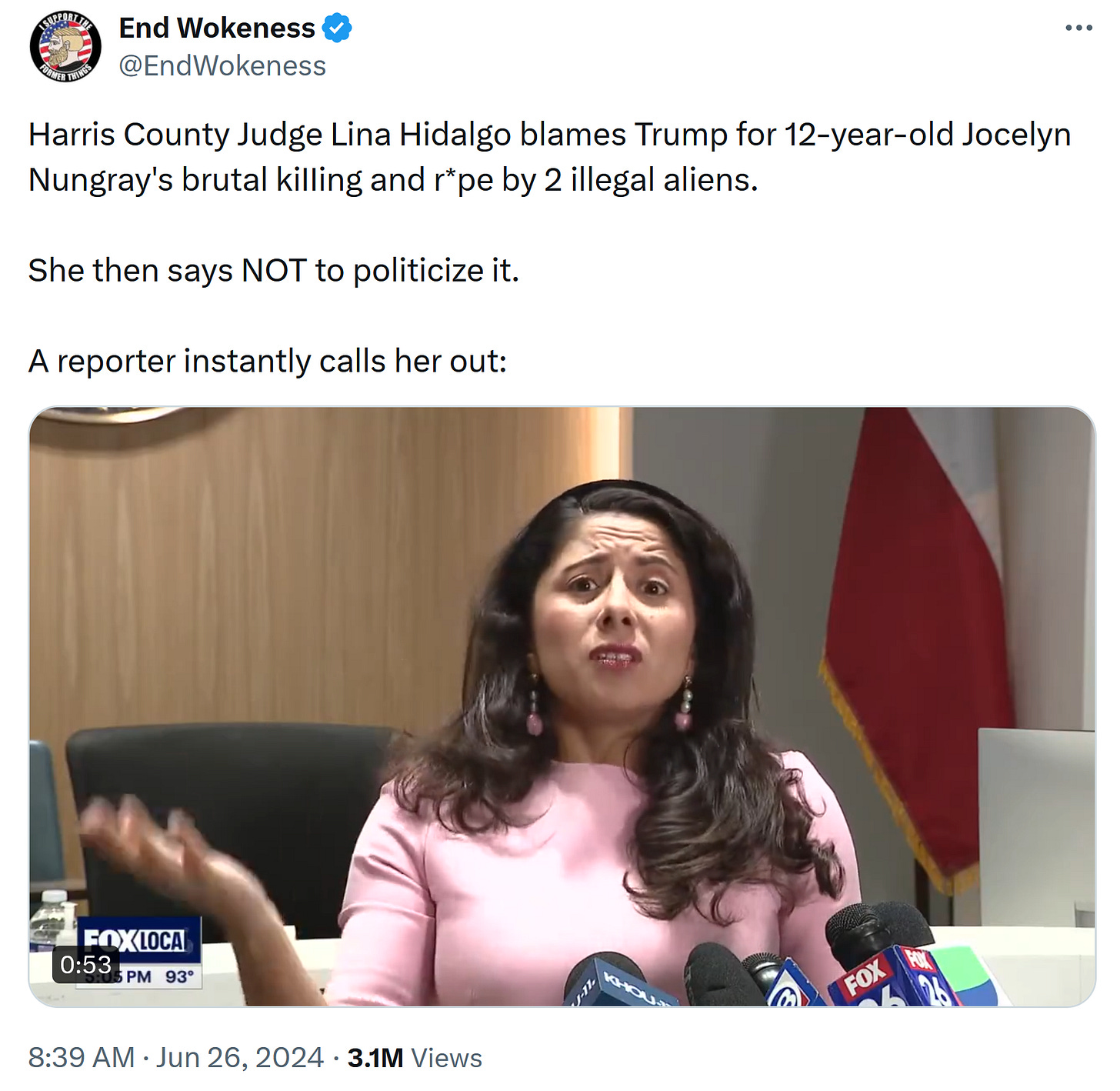
The maddening thing about statistics is when people use them to justify a wholly unrelated point. The most obvious example that comes to mind is when immigration activists cite illegal aliens as being less criminal than the overall population. Strictly speaking, I don’t doubt that’s true—most people would forgo a life of crime if a mundane, low-level offense like a speeding ticket opened the door to deportation. But it misses the more salient point: every crime committed by an illegal immigrant is one that would never have happened had the government enforced the border. Try telling any of those families that their daughters’ murders were a statistical anomaly and see how much goodwill that gets you.
That being said, I’m glad to hear the crime statistics report a downward trend, and I hope it continues. I won’t give either president credit for crime rates, but I will judge how our political parties influence the culture at large. While I think it’s dangerous to be completely deferential to the police—I think they need oversight and that we shouldn’t treat them as beyond reproach—I would argue it’s infinitely more dangerous to defund them and to empathize with criminals more than with their victims.
[Edit: now that I think of it, here’s an article Max would surely like, it’s right up your alley:
https://unherd.com/2024/06/california-has-surrendered-its-streets-to-assholes/
The gist is, the modern progressive is so hellbent on being seen as tolerant that they’ve surrendered their communities to antisocial assholes. The author cites an example of some guy who drives an extremely loud sports car through downtown Seattle in the wee hours of the morning, apparently for sport, and even the cops are afraid to cite him for anything, presumably because he’s black.]
Max, on the same day as your article, this one appeared from Noah Smith: https://www.noahpinion.blog/p/yes-of-course-crime-is-way-down
Noah is very smart, an economics PhD, and a liberal to progressive. He is the perfect distillation of the class of people who aren't driving anarcho-tyranny but will happily sit by while it happens as long as their they get their Starbucks and the Amazon drones still drop off cool stuff. I like Noah and I respect Noah, but he's too blinded by ideology and data to notice what's actually going on. However, I read Noah as a reminder that I may also be blinded by ideology, and getting outside your bubble is important.
I don't think that article is paywalled, and it's worth reading.